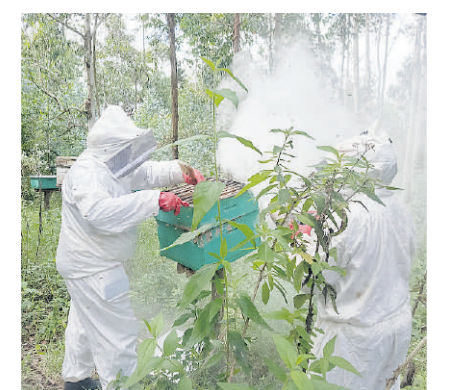

Since June last year, a new wave of agricultural transformation has been sweeping through Naivasha.
Thanks to the Direct Beneficiaries Grants Programme, part of the Forest and Farm Facility (FFF) implemented by the Food and Agriculture Organisation.
Farmers who once relied solely on maize are now finding greater success and incomes in beekeeping.
One standout example is Hifadhi Farmers Cooperative, where members have scaled up honey production, restored nearby forests and diversified their livelihoods in ways they never imagined just a year ago.
Under the FFF initiative, 14 forest and farm producer organisations across Baringo, Bomet, Bungoma, Laikipia and Nakuru counties received financial support to develop forest-friendly enterprises.
In Naivasha, Hifadhi has been able to give farmers hope.
“Hifadhi Farmers Cooperative was formally registered in 2014, but our story began two years earlier,” explains Francis Njogu, chairman of Hifadhi.
“Before we became a cooperative, we were a community forest association working alongside Eburu Forest to protect it.”
In those early days, residents were heavily reliant on charcoal burning and illegal logging. “The forest was being destroyed, and there was no sense of ownership among residents,” Njogu says.
“When the government said the community needed to take charge, we established the CFA in 2012, and beekeeping quickly became our tool for conservation.”
In 2014, the cooperatives society introduced beekeeping as part of its conservation strategy. “We began with about 50 traditional log hives,” Njogu.
“Local organisations provided community sensitisation training, teaching us how to involve neighbours in protecting the forest rather than destroying it.”
In those first seasons, the cooperative harvested only 100–200kg of crude honey, selling it for Sh200–350 per kilogramme.
Once Hifadhi connected with FAO’s FFF programme, they gained access to targeted training in beekeeping techniques, forest conservation, leadership and governance.
“As we improved our methods, production rose,” Njogu said. “Partner organisations and government agencies also helped us plant trees, 25,000 in the first year and 60,000 the next. The government even passed new forest preservation rules.”
Njogu explains that membership at Hifadhi has soared from just 61 farmers in 2014 to more than 561 today. “We’ve actively brought in youth, women and people with disabilities.”
“As a group, we now maintain more than 600 beehives. Beyond raw honey, we’ve started packaging and value addition which has created a range of honey products for market.”
“Our monthly output has reached 1–2 tonnes of processed honey, which we now sell for Sh600–800 per kilogramme,” Njogu adds. For Hifadhi, that translates into a significant boost in collective income.
Accountant Stephen Kamau says that out of 561 members, 144 are youths.
He further explains that in early 2024, Hifadhi received its second tranche of the FFF grant, another Sh1.9 million earmarked for establishing a diverse tree nursery (fruit, indigenous and flowering species) and funding exchange visits with peer organisations.
“We want to learn best practices in processing and value addition,” Kamau says. “Our long-term goal is to stabilise production here, centralise honey aggregation and penetrate big markets like Nairobi.”
For individual farmers like Magdalene Wanjiku Mwaura, the impact has been personal and profound.
“I had struggled for years growing maize and beans on five acres, only to see low yields,” she says. “Since switching to beekeeping, my farm’s productivity has grown through pollination and my income has jumped.”
Wanjiku now harvests about 5–10kg of honey per hive each season, and she’s learned to make value-added by-products: beeswax oil, lip balms and other items.
“I sell beeswax oil locally at Sh50–500 per unit,” she says. “Last year, I made roughly Sh100,000 just from oil and that’s on top of my honey sales. It’s a world away from the Sh30,000 I used to make selling beans.”
She’s also formed a women’s beekeeping group, training others on hive management and wax processing.
“With every seedling we plant, every hive we add, our future grows stronger,” Wanjiku says. “I hope more farmers will see what beekeeping can do for both their wallets and our forests.”

















